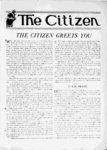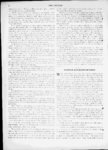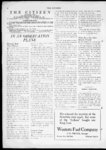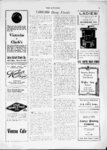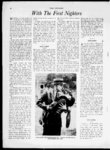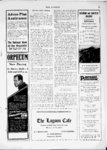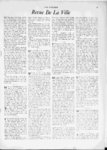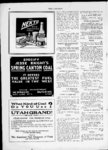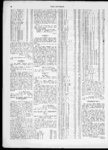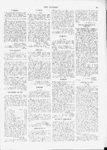| OCR Text |
Show THE CITIZEN 4 sionately as possible. Thus we shall be doing our country a patriotic service and ourselves no end of benefit. This by way of prelude to a discussion of the Mexican affair. The tendency will be to make partisan capital out of the invasion of Mexico, to so read events that they shall reflect evily upon the administrations handling of the problem. If it is to be war and constant turmoil in Mexico, with our army involved, criticism will have a legitimate place, but it should be kept studiously within the bounds of reason and fair play. If we remark, therefore, that had the administration adopted six years ago the forceful policy now being followed there, probably would be no warfare today, we are emphasizing an error of judgment which deserved criticism, but it is an error in which thousands of us shared. We have learned more about the Mexican leaders and they more about us. We are less pacifistic than we were in those days. If we confess frankly we shall sav that we look with less horror on the shedding of blood in a rightful cause. And some of us may be so much less idealistic than we were that we shall boast of the tendency of Americans to assert their rights by arms when necessary. At the risk of evoking cries of pain and accusation from the defenders of the League of Nations may we not ask what help such a League can be to us in an imbroglio like the present ? If we should invite the Carranza government to join the League for the purposes of the dispute, as one of the covenant articles permits, of what avail would it be? Our troops have not been fighting the Mexican government, but the revolutionists who attacked El Paso and killed and wounded some of its inhabitants. Suppose that we had adhered to the spirit of the provision which requires a three months cooling period before going to war. At the end of such a period the number of dead and wounded Americans probably would reach into the hundreds. Would the League solve for us the Mexican problem? Would it prevent warfare? Would it do anything except, perhaps, bring European intermeddling in our affairs? And in the end. would we not be doing just what we have done? We put these propositions in the form of questions because the obvious answers may be the wrong ones. Perhaps President Wilson, when he begins his tour of the United States in defense of the League, will be able to answer the questions so satisfactorily that all of us will throw up our hats for the League and cheer the American president who brought permanent peace to the world, even though he did not keep us out of war. At all events we shall welcome the president home and hope that he will visit oiir west and his west on his journey. But meantime the Mexican question is before us. It has not been solved after nearly ten years of revolution in Mexico, the murder of many Americans and the destruction or confiscation of many millions of dollars worth of American property. We may be sure that our fight against the Villistas, which saved Juarez for the Carranzistas, will win us no credit with Carranza, that devoted servant of German Junkerism who thinks in terms of Lenine w and Trotzky. When Pershing invaded Mexico to run down Villa the Carranza government put every obstacle in his way and continued to insult the government at Washington. When he became entrenched in power Carranza continued his insults and, when the European war broke out, was delighted to take up the German cause because, in his mind, lie thought he saw an opportunity to annoy the United States. He has been excused on the ground that he must keep himself in accord with violent factions of the Mexican people, but there was no demand among the Mexicans that Mexico join forces with Germany. Nevertheless, throughout the war, Carranza strove to make cur position as difficult as possible. Mexico became the refuge of the German spies and terrorists who fled from this country. Carranza welcomed them and permitted them and tliQir subsidized newspapers to plead the cause of the Ilun. One journal, El Universal, took the side of the United States so brilliantly and effectively, that Carranza ordered the editor out of the pig-head- i i ed i Editor Pallavicini was compelled to dispose of his property as best he could and quit Mexico. When the cruisers Ozark and Annapolis, at Tampico, took Americans and foreigners under their protection to save them from murderous Villistas the Mexican government insolently resented the act and declared that such protection was strictly the function ojj that government. And yet it had done and was doing nothing to afford protection. In fact, federal soldiers had joined in the warfare against foreigners. Whether his purpose was to harrass the allies or simply to steal their property, Carranza changed the constitution so that he might seize the oil wells. Under the guise of a tax law he made confiscation possible and was only interrupted in his plans by the stern protests of the allies and the United States government. Then Carranza began a propaganda of his own to denounce the allies as tax dodgers and he was especially virulent and vindictive in his attitude toward the United States. His plan was to take more than a billion dollars worth of property acquired legally by Americans and foreigitf ers under the guarantee of the constitution of 1857, a constitution, by the way, which he had pledged himself in- the Plan of Guadalupe to restore and keep in force. On the other hand we have Villa and his banditti. They have Indian placed at their head General Felipe Angeles, a of ability who, as an officer in the French army, was on detail in the United States during the war. No doubt they reckoned that he would increase their prestige and cause the United State's government to for? get the Columbus and Santa Isabel massacres. The Mexican problem, therefore, is filled with complexities. If it were simply a question of two factions with definite principles a solution probably would be easy, but it is complicated always by personal equations, by such stubborn equations as Carranza and Villa country. -- - pure-blood- ed or worse.. FOURTH OF JULY BEACON FOR WORLD. the Fourth of July, in the years that lie just ahead, retain WILL Americans that magical devotion which we call patriotism? In these days when the Bolsheviki are preaching the utter destruction of nationalism and when idealists are forming leagues to combine internationalism and nationalism, we cannot help wondering what will be the rule and prestige of patriotism in the new world order. Shall the work of the forefathers hold for us but a mild interest? Shall we regard that work as merely formative of the international spirit and state? Are Bunker Hill, Valley. Forge, Washington, Lafayette, Jefferson, Lincoln, Gettysburg and Appomatox to lose for us the significance that has invested these names with a poetic spell? When we read the speeches of the ten great orators of ancient Greece we see that love of country was as deep then as it ever has been in our day.- It led to sacrifices as glorious as any which were displayed by Americans in the world war. Little Greece, because of that power we name patriotism, was endowed with an almost supernatural ability to withstand Asiatic barbarism. Again and again a few thousand men, as at Thermopylae and Marathon, overthrew the - gleaming myriads of Persia. In the great war which ended but recently the spirit of patriotism was as potent as ever. Not only the citizens and subjects of the great powers, but the suppressed populations of once glorious nations, displayed a love of country which seemed to have nothing in common with internationalism. They sought to lift their nations once again to their old places in the world and to keep alive the spirit of nationalism, the spirit of patriotism. Which is to win nationalism, internationalism or the combina- tion of sentiments proposed by the idealists? It seems a safe prediction that, whatever the future may hold out in the way of world reorganization, patriotism will continue to shin, as luminously as ever in the hearts of men. The other day a French socialist, Gaston Routier, was sentenced to death for giving information to the enemy. The sentence was passed in default, for Routier was in hiding. In the midst of war lie . i ' |


